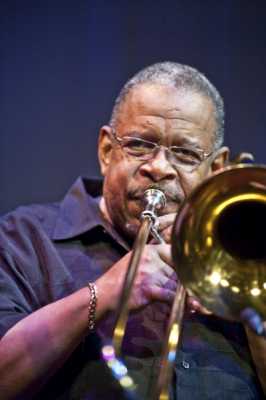| |
Taken from The Herald-Sun (Oct 08, 2015)
FROM BROWN TO BOOTSY
Fred Wesley and The New JBs to perform Sunday at Beyu Caffe
by Cliff Bellamy

Photo by Courtesy |
DURHAM — On voluminous recordings, concerts and television appearances, when James Brown said “Hit Me, Fred,” he was signaling trombonist Fred Wesley to play a solo. From 1968 to 1975, Wesley was Brown’s music director at a time Brown was releasing “Mother Popcorn,” “The Payback,” “Cold Sweat” and other funk classics.
Sunday, Wesley will perform two sets at Beyu Caffe with the New JBs. Wesley also helped pioneer funk with George Clinton, Bootsy Collins and Parliament, and also played with the Count Basie orchestra and has made several smaller ensemble jazz recordings. Sunday’s sets will feature a little bit of everything, with music from The JBs, Parliament, Wesley’s group the Horny Horns, along with his original compositions, Wesley said in a phone interview. He has worked with the musicians in The New JBs for more than 20 years. Joining him at Beyu will be Bruce Cox on drums, Dwayne Dolphin on bass, Reggie Ward on guitar, and Phillip Whack on sax. (His trumpeter, Gary Winters, is currently on tour in Europe.)
The New JBs usually tour Europe, but this month are on a tour of the Southeast that includes dates in Asheville and Greensboro, where Wesley will record a new piece that trumpeter Mondre Moffett composed with Wesley in mind for a CD commemoration of the International Civil Rights Center and Museum. Wesley said he is looking forward to playing at Beyu and Durham, where he has local musical connections.
He was part of trombonist and NCCU professor Robert Trowers’ first trombone summit in 2013, Trowers said. Wesley also played on Trowers’ recording “Point of View,” along with guest trombonists Slide Hampton and Al Grey. Wesley was one of the first to give the trombone presence in the funk music of the late 1960s and 1970s, Trowers said. He was “one of the few guys who gave the trombone some visibility. He was probably the model for guys who played funk on trombone.”
Wesley comes from a musical family. He studied classical piano with his grandmother, a music teacher. According to an allmusic.com biography, he gravitated to the big band music his father, Fred Wesley Sr., who was music department chairman at Mobile (Alabama) Central High School, listened to, and took up trumpet and finally trombone. He played in bands in the Army, and a few years after leaving the service got the call from a member of the Brown band.
Wesley told about his years with Brown in his 2002 book “Hit Me, Fred: Recollections of a Sideman.” Brown often would summarily fire or fine musicians who did not measure up to the sound he wanted. “James Brown had a definite idea of what he wanted,” Wesley said in his phone interview. “He did not waver from it. If you went along with it and developed it into a great song or a great idea, he would love you for it,” he said. Wesley quit the band for awhile beginning in late 1969, “but I came back with the idea that he was a great innovator, and I wanted to be a part of that.”
Listeners can hear the jazz influence in the solos that Wesley and saxophonist Maceo Parker played on Brown’s records (listen to Wesley’s solo, for example, on “Funky Good Time”). “We kind of infused some jazz into James Brown’s music, but James Brown was the focal point of that music,” Wesley said. “James Brown had the ideas, and we put it into action.”
In 1975, he left Brown’s band and began pioneering the next generation of funk music. Among the many recordings he made during this period were Parliament’s “Mothership Connection,” Bootsy Collins’ “Bootsy’s Rubber Band,” and his group the Horny Horns. Clinton and Collins “were as creative as James Brown, but they didn’t have a set idea of what they wanted. They wanted ideas from everybody,” Wesley said. “All of the people in that group had great ideas. We would put them down and George Clinton would amass those ideas into one great album.”
Among his more recent projects is the ensemble Abraham Inc., in which Wesley, klezmer musician David Krakauer and Canadia hip-hop artist Socalled play a fusion of funk, klezmer, hip-hop and jazz. Abraham Inc. was able to reach across genre boundaries, Wesley said. “Like Louis Armstrong said, there’s good music and bad music. If you look, you’ll find good music in all of it. We proved that with Abraham Inc.”
As a future project, Wesley would like to do a blues album. He recalled hearing the blues being played in the Blue Diamond Café, next to his grandmother’s house. “I’m going back to the basics,” he said.
|
|